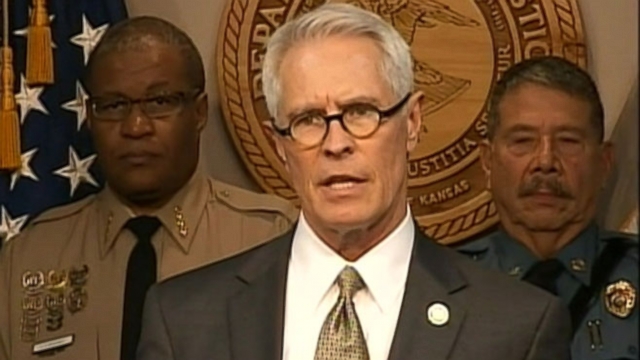Kansas Airport Worker Arrested in Car Bomb Plot

Auto Start: On | Off

A Kansas man who prosecutors say sympathized with violent terrorists was
arrested Friday as part of an FBI sting after he drove a vehicle loaded
with what he thought were explosives to a Wichita airport.
Investigators allege that Terry Lee Loewen planned to attack Wichita's
Mid-Continent Regional airport in a plot aimed at supporting al-Qaida.
Loewen, a 58-year-old avionics technician who worked at the airport for
Hawker Beechcraft, was arrested before dawn as he tried to drive onto
the tarmac. The materials in the car were inert, and no one at the
airport was in any immediate danger, authorities said.
Loewen, who lives in Wichita, had been under investigation for about six
months after making online statements about wanting to commit "violent
jihad" against the United States, U.S. Attorney Barry Grissom said. An
undercover FBI agent befriended Loewen, striking up conversations about
terrorism and Loewen's admiration for those who plotted against American
interests.
Authorities said Loewen spent months studying the layout of the airport,
its flight patterns and other details to maximize fatalities and damage
in an attack. During that time, he developed a plan with other
conspirators to use his employee access card to pull off the attack. The
conspirators were actually undercover FBI agents.
Loewen planned to die in the explosion, a fate that he said was
inevitable in his quest to become a martyr in a jihad against America,
according to court documents.
"Since early summer, he was resolved to take an act of violent jihad against U.S.," Grissom said.
Authorities said they believe Loewen acted alone. No other arrests were expected.
Loewen made an initial court appearance Friday afternoon, answering
"yes" in a strong voice to procedural questions. A U.S. magistrate
ordered that he remain jailed at least until a hearing next Friday after
prosecutors said he was a flight risk and a danger to the community.
His wife and attorney declined comment after the hearing.
His brother-in-law, David Reddig, described Loewen as a "good guy." He
said Loewen helped him pay off the debt on his truck and took care of
his home and chickens after an eye injury kept him from working.
"He is a hard worker and all that stuff," Reddig said.
But he said Loewen kept details of his life away from his relatives.
The case appears to be similar to a string of investigations conducted
by the FBI since the Sept. 11, 2001, attack. The FBI sting operations
have prompted controversy over whether the law enforcement tactics
involved entrapment of suspects and intruded on civil liberties. One
involved an undercover agent who pretended to be a terrorist, provided a
teenager with a phony car bomb, then watched him plant it in downtown
Chicago.
But the FBI has argued that the stings are a vital law tool for averting
potentially deadly terrorist attacks. And juries have returned tough
sentences.
In Loewen's case, court documents allege that he talked about
downloading documents about jihad, martyrdom and an al-Qaida "manual"
during his online conversations.
Investigators said he also frequently expressed admiration for Anwar
Al-Awlaki, the American-born al-Qaida leader who was killed in a 2011
drone strike in Yemen. Al-Awlaki emerged as an influential preacher
among militants living in the West, with his English language Internet
sermons calling for jihad, or holy war, against the U.S.
In August, an undercover agent offered to introduce Loewen to someone
who could help him engage in jihad. A few days later, he mentioned
providing a "tour" of the airport for one of the undercover agents.
In September, the undercover agent told Loewen he had returned from
overseas after meeting with individuals connected with al-Qaida. The
agent told him the "brothers" were excited to hear about his access to
the airport and asked Loewen if he would be willing to plant some type
of device, according to court documents.
"Wow! That's some heavy stuff you just laid down. Am I interested? Yes. I
still need time to think about it, but I can't imagine anything short
of arrest stopping me," Loewen told the agent, adding that he needed to
let Allah guide him.
The documents allege that he also asked for assurances that he wasn't
being set up, saying his greatest fear was not completing the operation.
The criminal complaint also details a meeting in November with other
undercover agents in which they discussed executing the plan before
Christmas in order to cause the greatest damage. He also provided
components from his employer that the agents requested for wiring the
fake explosive device, according to court documents.
On Wednesday, Loewen met with another undercover agent and helped assemble the false bomb, court documents allege.
Loewen was charged with attempting to use a weapon of mass destruction,
attempting to damage property and attempting to provide support to
terrorist group al-Qaida.
Hawker Beechcraft spokeswoman Nicole Alexander confirmed Friday that
Loewen worked at the company's aircraft maintenance facility at the
airport.
Loewen's neighbors said several law enforcement agencies converged early
Friday morning at the modest brick home where Loewen and his wife live,
just a few houses down from a local elementary school. Some neighbors
said the couple mostly kept to themselves and didn't participate in
neighborhood events.
Janine Hessman, who lives nearby, said she didn't know Loewen well but
liked his wife and spoke to her often. But if the allegations are true,
she said, "I don't really have any sympathy for him."
———
Associated Press writers Maria Sudekum and Heather Hollingsworth in
Kansas City, Mo., and Pete Yost in Washington contributed to this
report.


No comments:
Post a Comment